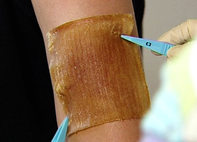Apart from being a nutritious and energy providing food, the medicinal value of honey has been around for many years, and was known since ancient times to be antimicrobial and antibacterial.

It was used by Greek, Roman, Egyptian and Chinese healers to treat diseases of the gut such as gastric ulcers and as a remedy for earaches, sore throat and coughs while in India, lotus honey was used to treat eye infections. Honey treats infections and heals wounds, including burns as well as insect stings and boils.
The application of honey can help heal infected wounds that do not respond to antibiotics and antiseptics. The viscosity of honey keeps wounds moist and provides a barrier to prevent infection. Honey treats psoriasis, helps with wound cleaning and tissue regeneration. Several recent studies have also shown honey to reduce the progression of cancer.
Medical grade honeys have powerful bactericidal activity against antibiotic-resistant bacteria that can cause life-threatening infections to humans. However, the antimicrobial properties vary according to the source of nectar. Honey used for medicinal or therapeutic purposes should be minimally processed, filtered but not heated. Certain honeys such a manuka can be marketed specifically as human remedies due to their special plant source and resulting unique properties.
Manuka Honey
The antimicrobial activity in most kinds of honey is due to the enzymatic production of hydrogen peroxide, a mild antiseptic. Researchers at the New Zealand University of Waikato discovered, in 1981, that Manuka honey has a much higher level of enzymes than regular honey. It is these enzymes that create natural hydrogen peroxide.
The antibacterial strength of manuka honey is expressed as UMF - Unique Manuka Factor - and assures its medicinal quality. Manuka honey combats Staphylococcus aureus infections and helps to treat conditions ranging from acne and irritable bowel syndrome to acid reflux and weak immune systems.